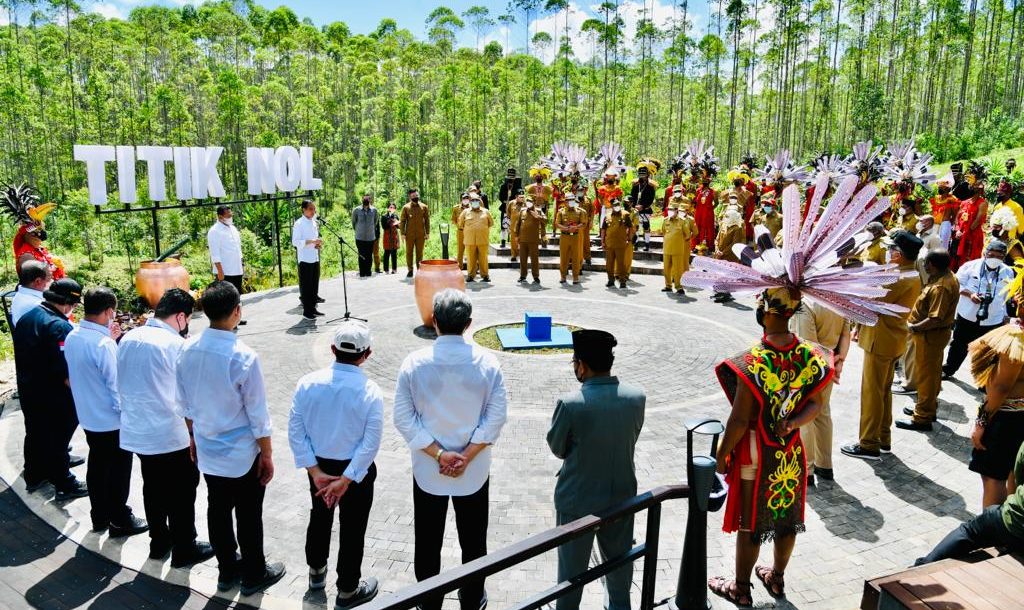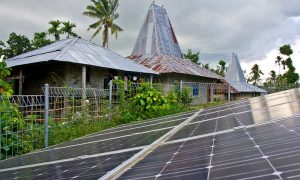This article is co-published with our partner 9DASHLINE.
Following the enactment of the National Capital Bill on 18 January 2022, Indonesia will legally begin the process of moving the capital from Jakarta to Kalimantan. Located between the two East Kalimantan cities of Balikpapan and Samarinda, the new city will be called “Nusantara”—the ancient name of the Indonesian archipelago. The move will begin by gradually relocating all ministerial personnel and civil servants, with a target of full relocation by 2045.
While the decision to relocate the capital is based on domestic considerations, it carries regional security implications, and will generate economic and environmental harm. Additionally, it requires considerable resources, constraining Indonesia’s capability to deal with regional tensions and possible security threats. With increasing tensions in the Indo-Pacific region, the government must address these implications to mitigate any future security risk associated with the relocation.
Rationales behind the relocation
There are at least two obvious reasons for the move: Jakarta’s overpopulation and its environmental vulnerability. Around 10.56 million people live in the current capital, which makes it overcrowded with traffic and complex urban development issues. The city has also been dealing with floods and vulnerability due to sea-level rise, especially in the last two decades. President Jokowi himself has preferred to stay in the presidential palace in Bogor, rather than Jakarta’s Presidential Palace.
But relocating the capital is not just about Jakarta’s urban condition. In terms of defence and military strategy, Indonesia’s security elites see the new capital as more easily defendable than Jakarta due to its geographic features. Nusantara is surrounded by forests, rivers, and mountains, which will benefit Indonesia’s military in case of any future armed attacks. In contrast, Jakarta is more vulnerable to conventional attacks by an enemy’s military given its location on the northern coast of Java.
The military has not specified who such a potential enemy might be, but in his reflections on moving the capital, Indonesia’s intelligence chief has mentioned several regional alliances and activities that might affect the country’s security including the Five Power Defence Arrangements (FPDA), AUKUS, and Chinese geopolitical influence in the region. Indonesia has been critical of AUKUS and objects to the arms race and power projection in the region. In addition, while it participates in China’s Belt and Road Initiative, the military has repeatedly detected Chinese coast guard vessels in its maritime domains, which constitutes a major threat to Indonesia’s territorial integrity.
Regional security implications
The capital relocation has some implications that might affect the regional security in the Indo-Pacific, concerning not only military and defence issues, but also economic and environmental security.
The first regional security implication is Indonesia’s shifting strategic focus during the process of moving. Located on the island of Kalimantan, Nusantara is 1,300 km away from Jakarta. The relocation will require the government to move all civil servants and military personnel by air or sea. For this, analysts have noted that a high number of military troops and significant resources must be deployed. According to Indonesia’s Military Chief, the military will deploy at least 30,000-50,000 personnel in the new capital’s regional commands, which will require significant resources. The budget for establishing a new regional military command is estimated to be USD 8.2 billion; for context, the country’s Defence Ministry’s had a budget of USD 9.3 billion in 2022.
This massive resource allocated for the relocation will considerably affect Indonesia’s ongoing defence and military modernisation plans. Indonesia will likely shift its focus from developing defence capabilities to meeting ongoing security demands caused by the capital relocation. In times of increasing geopolitical tensions in the Indo-Pacific region, redeploying forces and resources to secure the relocation process could impede the mitigation of potential crises that Indonesia may face at its borders. For example, it must secure its maritime domain from any intrusion of foreign military forces, such as in the South China Sea.
The relocation also raises questions as to who will be financially involved in the development of Nusantara and its related infrastructure. The government has estimated around USD 33 billion as the budget for the move, which is around 17 per cent of the national budget for 2022. The funding is expected to be raised from the government’s national budget, a Public-Private Partnership scheme with the private sector, and international development cooperation.
What happens when civil society, the media, and policymakers are based in different cities?
Out of sight, out of mind? Political accountability and Indonesia’s new capital plan
While Indonesia has committed to seek funding from various sources—including from Middle Eastern and European partners—there are some concerns related to the number of China-funded investment projects around the new capital. Chinese corporations have expressed interest in funding or providing loans to finance several projects in Kalimantan, including tolled highways between Balikpapan and Samarinda. China has also financed a hydropower project in the Kayan River since 2018, which is located in the northern part of the new capital.
These new investment partnerships could have long-term geopolitical implications as the new capital will be surrounded by China-funded investment projects. The Indonesian government must review the long-term geopolitical impacts of all investment projects around the new capital to avoid influence from any foreign party.
Finally, there are environmental security implications, which primarily relate to the global need to thwart climate change and end deforestation as agreed at the Glasgow Climate Change Conference. Kalimantan has been considered the ‘world’s lung’ due to its massive rainforests and biodiversity. It is feared that the capital relocation will lead to further deforestation and biodiversity loss and affect ongoing global efforts to tackle climate change and deforestation.
A recent study has shown that three provinces in Kalimantan are highly vulnerable to forest fires, while East Kalimantan has been affected by devastating forest fires in the past. The forest fires not only had a disastrous environmental impact on the country but also repeatedly caused transboundary haze pollution to neighbouring countries. Therefore, the risks of haze, forest fires, and potential impacts on climate change must be properly mitigated before the relocation process begins.
Indonesian lawmakers have tried to anticipate these concerns by mentioning the principle of ‘sustainability’ in the National Capital Bill’s Academic Paper. However, environmentalists have criticised the White Paper as being vague on mitigating the environmental implications of the relocation. With the need to build new housing complexes and government offices, it is unclear to what extent the government will clear the land and how biodiversity could be preserved.
Addressing security implications in the long-term development plan
While Indonesia’s capital relocation is mostly related to the country’s domestic development priorities, it carries regional security implications that must be addressed as tensions in the Indo-Pacific region increase.
To address potential security issues, the government needs to pursue several possible policy options. To address security concerns in the South China Sea, Indonesia should strengthen its Maritime Security Agency (Bakamla) as the front-line of its security response to South China Sea disputes, as one analyst has suggested. In addition, Indonesia needs to stay on track to modernise its military and defence equipment by 2024 (according to the original plans).
Indonesia also needs to carefully assess the economic, social, and sustainability impact of the capital relocation. In particular, it is important to consider its long-term financial capacity in relocating the capital, as well as reviewing any foreign infrastructure or investment projects around the new capital.
These security concerns must be incorporated into the new national long-term development plan, which will become the guideline for Indonesia’s planning between 2025-2045. Given the ambitions of the capital relocation, the Indonesian government needs a comprehensive security assessment—considering capabilities and geopolitical tensions in the region—in the long-term plan, which will provide a framework for future governments. Only in this way can Indonesia mitigate potential risks from the capital relocation.
 Facebook
Facebook  Twitter
Twitter  Soundcloud
Soundcloud  Youtube
Youtube  Rss
Rss 



